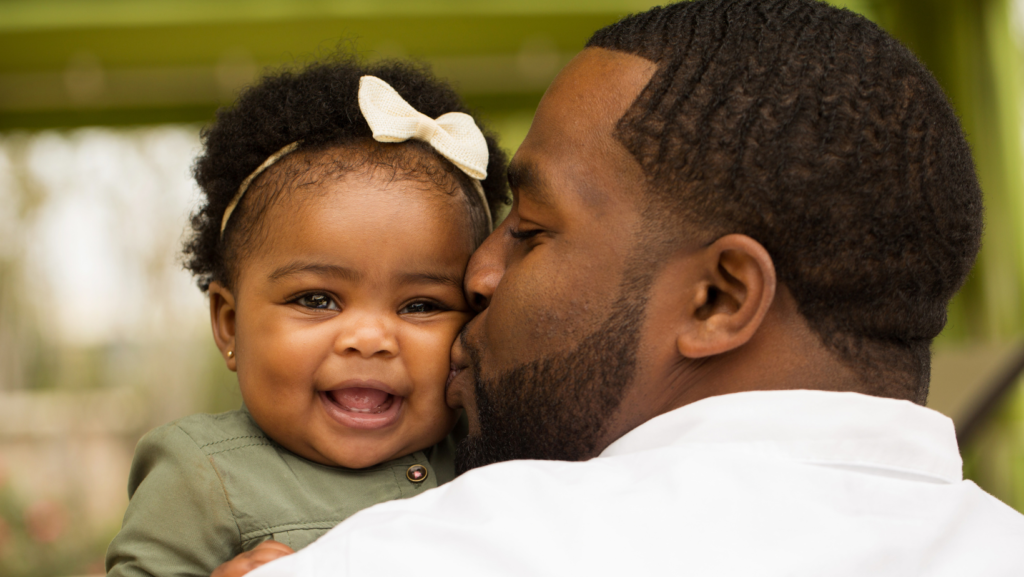By Darren Moore, Ph.D., MAED, LMFT, & Founder of I AM MOORE, LLC
Fatherhood is complicated, but for Black fathers, it is even more complicated. Black fathers must navigate a unique set of challenges that profoundly impact their roles within their families and communities — and beyond that — reflect broader societal issues.
These challenges encompass stereotypes and prejudices, systemic barriers, racial inequality, and even conflicting expectations of fatherhood. By shedding light on these intricacies, we can cultivate a deeper understanding of the struggles Black fathers face and foster a dialogue that is vital to dismantling systemic injustices and strengthening families across communities.

Challenges: Stereotypes, prejudice, systemic barriers, and racial inequality
In the realm of Black fatherhood, negative stereotypes and prejudices cast a pervasive shadow over their parenting journey. These misconceptions perpetuate the baseless notion that Black fathers are disengaged or absent from their children’s lives, fueling harmful assumptions and undermining the essential support they need.
One prominent misconception, the “Absentee Father Myth,” looms large, projecting Black fathers as distant figures. This stereotype distorts reality and disregards the active involvement and dedication that many Black fathers invest in raising their children. Beyond perpetuating inaccurate narratives, this misconception restricts the acknowledgment of their contributions, resulting in limited access to vital resources and opportunities.
These stereotypes compound, leading to unjust judgments and restricted support. As a result, Black fathers often face skepticism and mistrust from peers, educators, and professionals within social and healthcare systems. Such skepticism erodes their confidence and impedes the formation of strong parent-child relationships, hindering their ability to seek assistance when needed.
Moreover, systemic barriers further impede Black fathers. For instance, educational disparities restrict their prospects due to unequal access to quality education, obstructing their path to securing stable employment and limiting their capacity to offer comprehensive family support.
Addressing these challenges demands a collective effort to reshape societal perceptions and acknowledge the diverse roles Black fathers fulfill. By recognizing their multifaceted contributions, society can cultivate an inclusive environment that values their commitment and involvement.
Challenging stereotypes and systemic barriers are pivotal for fostering an accurate, supportive understanding of Black fathers’ experiences, enabling them to establish nurturing environments for their children, free from the burden of unfounded prejudices.

Coping and overcoming
Amidst the myriad challenges, Black fathers exhibit remarkable resilience as they navigate the complex terrain of parenthood. Despite the systemic barriers, stereotypes, and inequalities they face, many find ways to cope with and overcome them, underscoring their commitment to their families and the vital role they play in their children’s lives.
- Community Support: Black fathers often draw strength from their communities to form networks of mutual support and camaraderie. These networks provide spaces for sharing experiences, seeking guidance, and finding solace in the knowledge that they are not alone in their struggles.
- Mentorship and Role Models: Engaging with positive role models and seeking mentorship can offer invaluable guidance to Black fathers. Connecting with those who have successfully navigated similar challenges allows Black fathers to gain insights and access to tools that can help them overcome obstacles while fostering personal growth and development.
- Resilience and Adaptability: Black fathers exhibit remarkable resilience and adaptability, finding creative ways to provide for their families and offer emotional support. Their ability to persevere in the face of adversity exemplifies their dedication and love for their children.
- Advocacy for Change: Many Black fathers engage in advocacy efforts to bring about systemic change. By raising their voices, they contribute to dismantling barriers, challenging stereotypes, and advocating for equitable opportunities for themselves and their families.
Through these coping mechanisms and acts of resilience, Black fathers demonstrate their unwavering commitment to their roles as caregivers, providers, and nurturers. Despite the challenges they confront, they continue to strive for a better future, where their families can thrive and flourish.
As they persevere through these challenges, Black fathers epitomize resilience in the face of adversity. Their determination to foster a brighter future for their families signifies an unwavering commitment that deserves recognition and support.
By amplifying their voices, challenging societal norms, and advocating for equitable opportunities, we collectively contribute to a more inclusive and compassionate society — one that honors the invaluable contributions of Black fathers and strengthens the foundation of families across diverse communities.
– Darren D. Moore, Ph.D., MAED, LMFT, is a Father, Husband, Clinical Professor, and Licensed Marriage and Family Therapist. He owns I AM MOORE, LLC, a Georgia-based counseling practice, providing therapy and consulting services across multiple states. As the Associate Director for Clinical Training and Supervision at Northwestern University’s Family Institute, he specializes in fatherhood, mental health, workplace dynamics, and family relationships. Featured in media like Newsweek and Men’s Health, Dr. Moore’s expertise spans higher education, mental health, and more.

